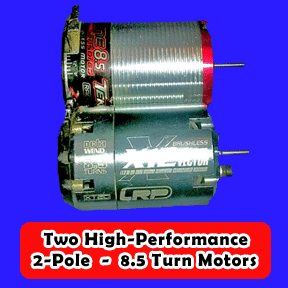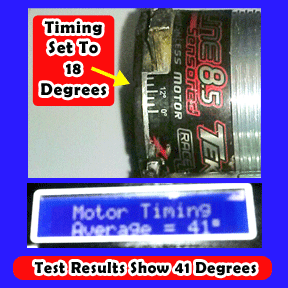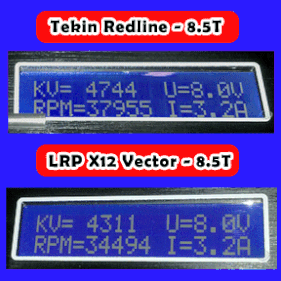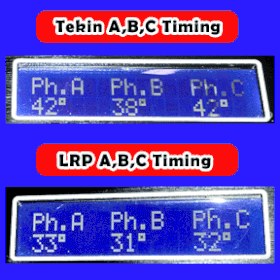Ever Wondered How Fast Your Motor Really Is?
RCcarStars strives to bring racers and bashers the most modern motor diagnostic tools, these tools will allow you to see what the true specs are for your brushless motors 540/550 size motors that run on 2 cell Lipos.
I think everyone has agreed that brushless motors are one of the best things that have happened to the world of RC racing for some time. They have taken away lots of the maintenance issues of 'Brushed Motors" and also removed some of the "Mystery of Motor Tuning". Essentially if you see a guy with a fast car at the track, you can go buy the equivalent motor you should at least have parity in speed.. or will the RCcarStars Motor Analyzer Test, "prove that wrong"?
The Motor Analyzer Test is not a substitute for a full-blown motor dyno test, where the motor is actually tested "under-load" and will give you additional more detailed data that will be more in line with ESC data in addition to Torque data....
I think everyone has agreed that brushless motors are one of the best things that have happened to the world of RC racing for some time. They have taken away lots of the maintenance issues of 'Brushed Motors" and also removed some of the "Mystery of Motor Tuning". Essentially if you see a guy with a fast car at the track, you can go buy the equivalent motor you should at least have parity in speed.. or will the RCcarStars Motor Analyzer Test, "prove that wrong"?
The Motor Analyzer Test is not a substitute for a full-blown motor dyno test, where the motor is actually tested "under-load" and will give you additional more detailed data that will be more in line with ESC data in addition to Torque data....
The Motor Analyzer Test is great for the following reasons:
- The "Motor Speed Test" will let you compare motors "side-by-side" to see what kind of RPMs the motors are generating with no-load on motor. (This is the same information that most manufactures provide in their specification on the box) (Note: RPMs are derived from taking the current voltage and multiplying it by the KV - So the higher the KV=Higher RPMs, Lower KV=Higher Torque) Usually 300kv difference is no big deal in overall performance or speed of a motor, but when you see variances of more than 300kv or more, that generates into speed and possible lap time savings or loss.
- The "Motor Efficiency Test" portion of the analysis, will show what motor may be more efficient on power when you compare the AMP draw. AMPs ultimately equal "Motor Heat", so you alway like to see lower AMP draw numbers as that means that motor is more efficient at higher RPMs.
- The "Motor Timing Test" portion of the motor test will show you the true average of the motors endbell timing. (we find that most of the time that the timing marks on the motor can endbell are just for reference and not usually that accurate as to the true endbell timing degree when measured. This can play a huge part in knowing if you should increase your "ESC" timing.... Many people automatically just increase the ESC timing without knowing what the motor is already set at. This leads to poor performance and "Heat Issues")
- The "Motor Sensor Timing Test" portion will allow you to see the A, B, and C pole timing degrees of each sensor. Many times if you see large variations between these numbers it can mean one or two of the sensors may be out of alignment on the sensor board, or you may be able to fine tune the variances by shimming the motor closer to the sensors.
- The "Hall Effect Test" will assure that all 3 sensors are actually working correctly and soldered in the right order.
- The "Noise Level Measurement Test" can be used as a benchmark if the motor is new or has fresh bearings. We have found that when bearings start to fade you will see about a 15dB increase. This test lets you know when it may be time to replace your bearings.
- Used motors you may have purchased from someone else or online. This is a quick way to determine if you got what you paid for!
- Use the Analyzer to compare motors of like "TURNs or KV". You will find that different manufactures models and brands will test "Hotter or Colder" than you may have anticipated.
- Stock Class Motors - What can we say but this class is so competitive, that it only makes sense to choose your best Stock Class Motor to race with. Again even as much as 400 RPMs or a lower KV may make a difference over a 5 or 6 minute race depending on the track. ( We also advise our racers to use our "Magnetic Rotor Strength Test". Usually as long as the rotor is of the same diameter and length, you can swap rotors. The higher the magnetic strength rating the more torque the motor will put out, with the weaker strength rating giving more RPMs.
- Testing new or freshly rebuilt motor and "Benchmarking the Data", then at the end of the season recheck the motor and compare against "Benchmark Data" and identify any major changes that may affect performance.
- For those of you who race to the edge and your battery is on the brink of "Cutoff", these tests will help you find the more efficient motor (less AMP Draw).
- Ideal for testing a new motor or after you have adjusted the Motor Endbell Timing. It will record the true motor timing so you can adjust the ESCs timing according without fear of overheating the motor.
|
What's Included:
|
Analysis Specifications:
|
Here's an Example of Why You Need to Test Your Motors
|
Example of a Racing Motor Analysis:
We tested (2) used 8.5 Turn - 2-Pole Brushless Motors and tested them both at 8 volts and ran the motors to maximum power. The results came back surprising because the Tekin timing was so far off.
Analyzer Results:
Overall Comments on These Motors Tested: The testing results show us the power of motor timing and how important it is to test against the timing mark. Let's look at the Tekin first, the timing on the endbell said 18° but the actual timing is 41°. If you did not know the real timing was 41° and added another 15° of timing on the ESC, this motor would be in danger of overheating or worse. The RPMs and KV look about right for the timing settings. But if we did not do this test, we would have thought the LRP motor had the higher timing and if we would have just mounted up the motor and did not change the timing, we would have thought this motor would be faster than the Tekin 8.5T motor. The sensor timing test also identified that the Tekin B sensor is about 4° off of the other sensors. We like to see about 2° or less on the timing sensors. |
"Just from the small example, you can see you must test your motors to really understand the performance possibilities"
Contact Us Today To Setup An Appointment
Contact Us Today To Setup An Appointment
KV Results• Shows True Motor KV (no-load)
• KV Results @ 3 Throttle Levels • KV Value Accuracy +/- 3% |
RPM Results• True Motor RPM (no-load)
• RPM Results-3 Throttle Levels • RPM Value Accuracy +/- 3% |
AMP Results• Shows AMP Draw (no-load)
• AMP Draw @ 3 Throttle Levels |
Timing Results• Shows A,B,C Sensor Timing
• Shows "Real" Motor Time-Set • Motor Timing Accuracy +/- 4% |







